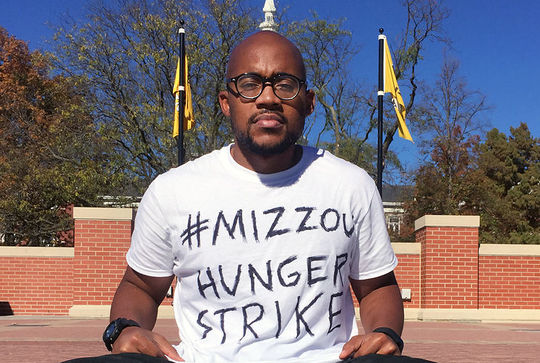 aNewDomain — There are some memes and blogs creeping around the Internet suggesting that protest at school is A) new and B) getting out of hand. And that students need to toughen up, given that all they are doing is protesting trivial issues.
aNewDomain — There are some memes and blogs creeping around the Internet suggesting that protest at school is A) new and B) getting out of hand. And that students need to toughen up, given that all they are doing is protesting trivial issues.
Even Melissa Harris-Perry and Larry Wilmore seem to be having trouble wrapping their heads around what’s going on out east.
Jonathan Butler undertook a hunger strike, demanding that the president of University of Missouri resign. He cited a number of racial problems on campus:
In the past 90 days alone we have seen the MSA (Missouri Students Association) President Payton Head being called the N-word on campus, graduate students being robbed of their health insurance, Planned Parenthood services being stripped from campus, #ConcernedStudent1950 peaceful demonstrators being threatened with pepper spray, and a matter of days ago a vile and disgusting act of hatred where a MU student drew a swastika in the Gateway residential hall with their own feces …”
 So, there’s a lot of commentary about the PC police and about how magnificent protest used to be and about trigger warnings – go to college and meet people who disagree with you! College should be hard! This is a time to experiment and to learn to become a better citizen! But I think it misses the point. And the point is racism.
So, there’s a lot of commentary about the PC police and about how magnificent protest used to be and about trigger warnings – go to college and meet people who disagree with you! College should be hard! This is a time to experiment and to learn to become a better citizen! But I think it misses the point. And the point is racism.
When someone calls you a (insert N-word here), the problem isn’t that you need to meet people who disagree with you. When the school erodes your health care, the problem isn’t that school is supposed to be hard. When the police oppress free speech with pepper spray, that’s not your failure to experiment; and the transformative experience of higher education is clearly threatened with feces-smeared swastikas.
In other words, we’re pointing fingers at people trying to effectively self-advocate, and not looking at all at the culture of violence, racism, sexism and rape that inspired the protests to begin with.
Look, none of this is new. These concerns about our kids going soft started to emerge at least 21 years ago — check out this movie, for example.
And as early as the 1960s, students protested against segregation from black colleges like Grambling, wondering why the football team got so much attention and the academics so little.
The idea that the students are to blame for the protests, that they are weak or that the PC police are oppressing the rest of us, that’s an old strategy. This is the land of blaming the victim. We blame the poor for poverty, women for being raped, illegal immigrants for the state of their nations of origin. We do all that so we don’t have to take any responsibility.
What Butler started his protest on, what the Mizzou football team threatened to boycott the season over in sympathy, is serious stuff.
Someone willing to draw a swastika in excrement might also be willing to, say, walk into a historically black church or college and shoot some people.
Someone willing to yell racial epithets across the quad, well, they might need some empathy training – or they might be a radicalized American racist. Such events point towards physical unsafety.
Sure, it’s not the Vietnam War. But it is a continuation of the same protest: Why should you go to fight for freedom for other people when you don’t have that freedom back home?
The physical threat aside, we still have the structural violence. As M.L. King, Jr. put it, what good is it to be free to sit at the lunch counter if you can’t afford a sandwich? Structural violence is a system of laws, regulations and policies that have disparate impact — they create and maintain racial inequities. They do this surely through color-blind policies like the War on Drugs and through discontinuing affirmative action. They do it through failing to address bigotry on college campuses and by blaming black protesters for weakness as a distraction from the very real issues.
When Butler sees peaceful protesters threatened with pepper spray bear in mind he was at the Ferguson protests, too. What’s on his mind is the law-and-order mentality that incarcerates black men as a political measure (seriously, read Michelle Alexander) and that murders with impunity. How many unarmed black man murders by police are in the news at this moment?
And the issue really is now-defunct U Miss President Tim Wolfe. Because, in a racially-charged atmosphere, under chronic systemic and structural violence, do you want a leader in office who doesn’t believe in structural violence?
What’s going on here is white privilege. Wolfe doesn’t believe in systematic oppression because he doesn’t experience it, and he doesn’t think he perpetrates it. But he made $450,000 a year, plus six-figure bonuses – more than enough money to insulate him from problems of fairness. He worked hard and got his, and therefore likely believes if you work hard, you can get yours, too.
It’s well documented by now that ethics slip and prejudice increases as one’s assets grow in value. Could one more side effect of paying massive salaries to university presidents while starving the faculty be that the presidents really cannot see the problems of the small people – the students, in this case?
In short, the protests going on these days are not about trivial issues. They are continuations of the unfinished Civil Rights movements of the 1960s and 1970s.
For aNewDomain, I’m Jason Dias.
Cover image: ColumbiaMissourian.com, All Rights Reserved; image one: “2007-09-02 OC-17 gas” by Gophi – Own work. Licensed under CC BY-SA 3.0 via Wikimedia Commons; image two: ClarionLedger.com, All Rights Reserved.
p.s.
How many soldiers fought in WWII or Vietnam, then went home to segregated states? Here’s Mohammed Ali on that score:













